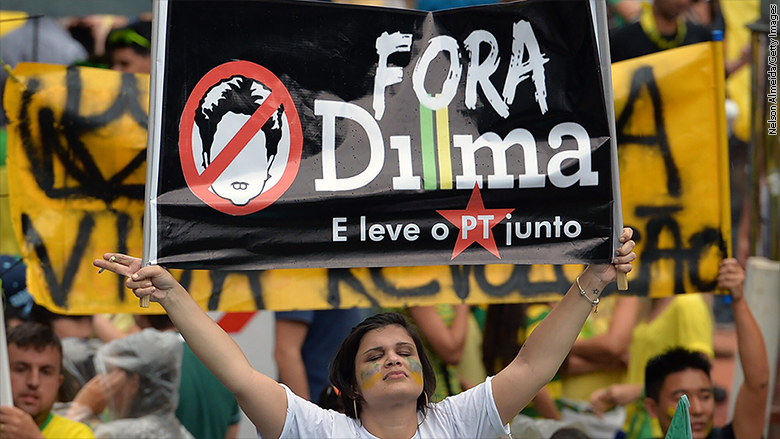
Brazil's economy is running on empty.
Over a million Brazilians protested in the streets Sunday, calling for the impeachment of President Dilma Rousseff.
A massive corruption case involving the president helped spark the protests, but Brazilians also marched out of frustration that Brazil's economic boom is over.
South America's largest economy was last decade's emerging market darling. Now it's edging toward recession and its currency is losing value quickly. The corruption scandal and economic collapse are creating a perfect storm for public unrest.
Related: Brazil's scandalous boom to bust story
Commodity crisis: Brazil is the world's largest producer of sugar, coffee, soybeans and near the top in iron ore and oil. Despite a rising middle class, Brazil is still a commodities export economy.
Its biggest trading partner is China, which is slowing down right now. That's decreasing demand for Brazil's goods, causing prices to tank.
Sugar prices are down 24% from a year ago. Coffee is down 29% to $1.35 per pound. Soybeans -- you guessed it -- have dropped 32% in the past 12 months. Five years ago when Brazil's economy was cruising to new heights, all those commodities were fetching much higher prices.
Although cheaper coffee and sugar may sound good to American consumers, those are billion-dollar businesses that Brazil is losing money on. The commodity price collapse is starting to cause high inflation as the government raises taxes and fees to compensate for lost revenue.
Regular Brazilians are feeling the impact. Prices for goods in Brazil are up nearly 8% from a year ago -- the biggest change in over a decade.
Related: China's big chess move against the U.S.: Latin America
That means everything from groceries to gas to rent is going up while everyone's money is worth less and less, seemingly by the day.
The Real Impact: On top of that, Brazil's currency, the Real, is fading fast.
One U.S. dollar was worth 2.60 reals at the beginning of the year. Now one dollar equals 3.27 reals. That's a 25% currency slide in two and a half months. It's even worse when you consider that just a few years ago, one dollar equaled about 1.60 reals.
Brazil had hyper inflation problems in the 1980s and 1990s, and this inflation isn't anything near that scale. But the sudden inflation is a concerning sign for people who know it all too well.
Unfortunately, Brazilians are no stranger to political corruption either.
Related: Five reasons why Venezuela may be the world's worst economy
The other oil crisis: While many oil producing nations, including Brazil, grapple with falling energy prices, Brazil must confront a another debacle. Prosecutors are investigating Petrobras, Brazil's state-owned oil company, for funneling bribes to Rousseff's election campaigns and legislators in her Workers' Party.
Petrobras stock is down 60% in the past six months, and Moody's downgraded the company's debt to a junk rating a few weeks ago.
Of course, the fun doesn't stop there. Brazil faces the same dilemma of falling oil prices that other nations do. A barrel of oil is $44 today, way down from about $100 only six months ago. Brazil is among the top 11 nations in oil production.
The culmination of the commodity bust, inflation and political scandal mean one other thing is tanking: Rousseff's approval rating.
Rousseff's approval rating is 23%, according to Datafolha, a Brazilian poll. Her predecessor, Luiz Inácio Lula da Silva, left office in early 2011 with an 83% approval rating.


